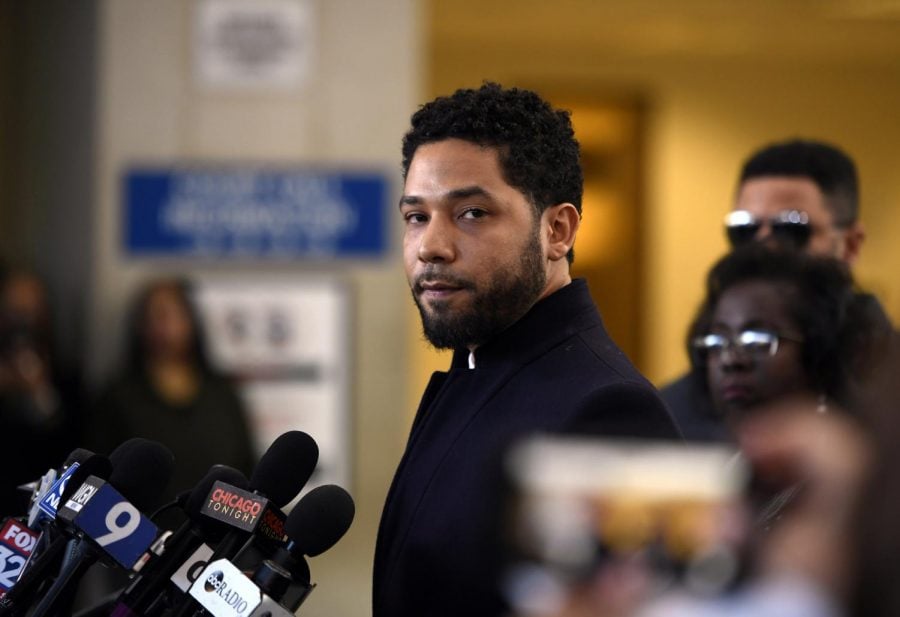Despite Smollett controversy, hate crime still a pervasive issue
Credit: AP Photo/Paul Beaty
In this March 26, 2019 file photo, Actor Jussie Smollett talks to the media before leaving Cook County Court after his charges were dropped, in Chicago. Chicago’s top prosecutor has released 2,000 documents in the Jussie Smollett’s case and explained she recused herself from an investigation into his claim he’d been the target of a racist, anti-gay attack solely because of false rumors she was related to the “Empire” actor. The Friday, May 31, 2019 statement from Cook County State’s Attorney Kim Foxx came two months after her office’s suddenly dropped all charges against Smollett that accused him of staging the attack on himself.
Amid the widely publicized Jussie Smollett controversy, in which the “Empire” actor claimed to have been the victim of a racially-motivated and homophobic attack, statistics show that hate crimes are on the rise nationally.
According to the most recent statistics from the FBI, there were 7,175 incidents of hate crime reported to the bureau’s Uniform Crime Reporting program in 2017. Of these, a majority, 59.6 percent, targeted victims’ race, ethnicity or ancestry — roughly 4,100 reported cases. Religion was second, at 20.6 percent (1,564 cases), followed by sexual orientation at 15.8 percent (1,130 cases). The number of reported hate crimes increased 17 percent from the previous year.
In Chicago, a city with a population of about 2.7 million, the FBI recorded a total of 41 hate crime cases in 2017: 16 were motivated by bias against the victims’ race, 17 against their religion, seven against sexual orientation and one against gender identity. Compared to 2016’s figures, it’s about a 20 percent decline in the number of reported cases. But Julie Justicz, an attorney with the Chicago Lawyer’s Committee for Civil Rights and director of program advancement for the Chicago Hate Crime Project, said she is concerned that many hate crimes may go unreported.
“A lot of times, community members may feel wary about coming forward and reporting hate incidents to the police,” she said.
Legally, she said, a hate crime is “an underlying criminal offense, coupled with a bias intention to harm a specific group of people based on race, ethnicity, national origin, LGBTQ status, religion and physical/mental incapabilities.”
The Chicago Police Department uses the term “bias-related crime” to refer to criminal acts perpetrated based on the “race, color, creed, ancestry, nationality, religion, sexual orientation, physical or mental disability or gender” of a victim. According to CPD’s 2017 annual report, the latest available, the Civil Rights Unit investigated 61 bias-related offenses in 2017, down from 71 in 2016.
“It is imperative that we recognize hate crime as a separate and, in many cases, more serious than crimes without that additional bias motivation,” Justicz said. “Most people who study hate crime believe that over the last few years we have witnessed an escalation in hate crime because of types of national rhetoric that has attacked certain groups of people.”
Most estimates suggest that the majority of hate crime incidents are not falsely reported. After reviewing thousands of confirmed police reports from the last several years, for example, a 2017 report from the California State University-based Center for the Study of Hate and Extremism found that only 34 cases were misreported, and in seven cases it was “unclear” if the incident was falsely reported or not.
According to Justicz, community support is key for victims of hate crime.
“One thing that communities can do is create the option for people who have been victims to report the hate crime to a trusted third-party organization for support,” she said.
At DePaul, freshman Nathalie Hoste said she thinks reducing hate crime starts at an early age. “I think if you teach your children from when they are little that it doesn’t matter what a person does or believe in,” she said. “If you teach them that, then you can’t discriminate based on what you are taught.”
Freshman Burcin Asilturk said she experienced verbal hate in high school during an in-class activity.
“We were reading an article about terrorism and someone turned to me and was like, ‘She’s Muslim, so she’s a terrorist,’ so that was really hurtful,” she said. “There is a lot of people of different ethnicities and stuff in America, so I think people should learn more about different cultures and ethnicities.”
Asilturk said she hasn’t been the recipient of verbal abuse at DePaul.
Justicz said preventing hate crime starts with victims feeling there is support for them to seek justice.
“It is about speaking out,” she said. “Many of the victims of hate crimes who I work with say that what’s most important to them is to hear from the community that this is not okay. We are stronger together, and with that, hate crime has no place in our pluralistic society.”







